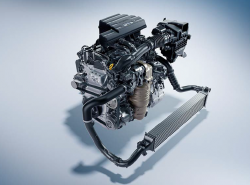Honda’s Earth Dreams Engines Prone To Early Failure – Lawsuit Featured
 A lawsuit was recently filed against American Honda Motor Co. and Honda Motor Company Ltd. (“Honda”) on behalf of current and former Honda vehicle owners and lessees of the following model years equipped with the “Earth Dreams” 1.5 liter direct injection engines.(“class vehicles”) –
A lawsuit was recently filed against American Honda Motor Co. and Honda Motor Company Ltd. (“Honda”) on behalf of current and former Honda vehicle owners and lessees of the following model years equipped with the “Earth Dreams” 1.5 liter direct injection engines.(“class vehicles”) –
- 2019-2021 Honda CR-V;
- 2019-2021 Honda Civic;
- 2018-2021 Honda Accord.
The complaint alleges that Honda has long been aware of the fact that its Earth Dreams engines are predisposed to a defect that causes fuel contamination of the engine oil that results in oil dilution, decreased oil viscosity, premature wear and ultimate failure of the engines, engine bearings and other internal engine components. The complaint also alleges that Honda concealed the existence of this engine defect from consumers.
Despite knowledge of the defect – both internally from pre-sale durability testing and externally via complaints received by the National Highway Traffic Safety Administration (“NHTSA”), Honda refuses to compensate vehicle owners for expensive motor repairs arising from the defect.
The Earth Dreams Engine
Honda’s Earth Dreams engines were designed to increase fuel economy and horsepower while reducing the impact on the environment. The engines features a technology known as Gas Direct Injection (“GDI”).
In GDI engines, the injectors are fed gas through a high-pressure fuel pump. The nature of that high-pressure means some of the fuel just blows by the piston rings and makes its way down into the crankcase where it mixes with engine oil.
Other GDI engines rely on engine heat to help burn off that escaped fuel, but Honda’s efficient design doesn’t generate enough heat. This means gas gets into the oil and lowers that oil’s viscosity, reducing its lubricating benefits and creating long-term damage to engine components.
Should oil dilution occur, vehicles may require replacement of fouled spark plugs and fuel injectors in addition to camshaft and rocker-arm assembly all at enormous cost to the customer.
Honda’s Response To The Defect
Honda tried to pass off the defect as being only a problem in colder climates. When that turned out to be false they blamed drivers for taking too many short trips and released a series of software updates that led to a stop-sale order in China. In reality, the engines operate so efficiently that they fail to produce enough heat to burn off escaped fuel.
Honda eventually extended the powertrain warranty to help cover those inevitable engine breakdowns – but only for 1 year. Honda also instructs owners to change the engine oil more frequently – in some cases as often as every 500 miles.
Lawsuit Alleges Honda Breached Consumer Protection Laws
The complaint contends that had Honda warned prospective customers at the time of purchase or lease about the engine defect and/or the monetary costs to repair issues arising from the defect, sales would suffer or customers would have paid substantially less for vehicles.
By not informing customers about the defect, Honda violates a number of state laws designed to protect consumers.By knowing about the defect and refusing to cover costs of repairs Honda also violates its warranty.
The class action seeks the force Honda to repair, recall and/or replace the Class Vehicles and to extend the applicable warranties to a reasonable period of time as well as acknowledge and inform customers of the cause of the manufacturing defect.
Case Status: Open – Not Accepting New Clients









